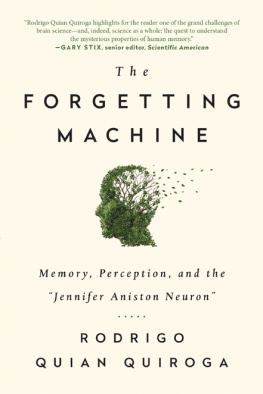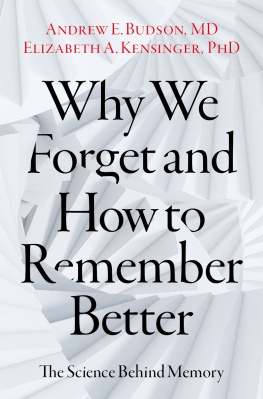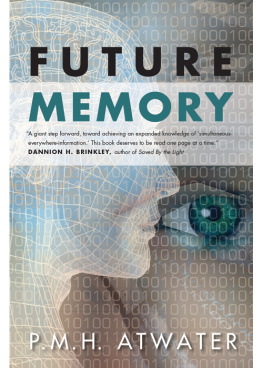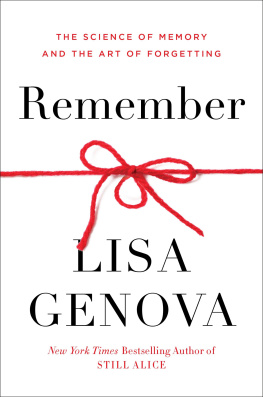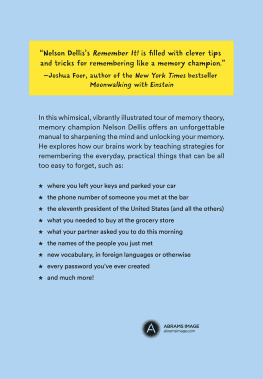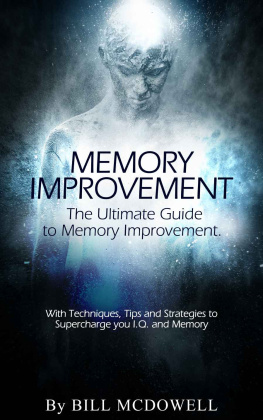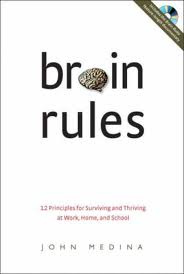PRAISE FOR THE FORGETTING MACHINE
Quian Quiroga, himself an imaginative pioneer in the brain sciences, combines state-of-the-art knowledge of the human mind, admirable cultural literacy, and an enticing presentation style. If you wish to take a fascinating and memorable journey into the riddles of human perception and memory, The Forgetting Machine is the gate to enter.
YADIN DUDAI, PROFESSOR, WEIZMANN INSTITUTE
OF SCIENCE AND NEW YORK UNIVERSITY
Rodrigo Quian Quiroga is one of those rare computational neuroscientists who really knows how to bring complex and abstract concepts to a popular audience. This charming and informative book explains current understanding of how memories are encoded in the brain in elegant prose that reflects Quian Quirogas engagement with philosophy and the arts as well as hard-core science.
ALISON ABBOTT, NATURE MAGAZINE
The author, a noted brain scientist, takes the reader on an exciting whirlwind tour of vision and memory. His take-home message is that our brains dont faithfully record the pixels making up any one scene nor do they recall anything but a minute fraction of our life events. Most of what we do, see, and remember is filtered, interpreted, and inferred.
CHRISTOF KOCH, CHIEF SCIENTIST AND PRESIDENT,
ALLEN INSTITUTE FOR BRAIN SCIENCE, SEATTLE
Rodrigo Quian Quiroga highlights for the reader one of the grand challenges of brain scienceand, indeed, science as a whole: the quest to understand the mysterious properties of human memory. He does so while providing an eloquently intelligible primer on the processes that underlie our recollections. He leads the reader from an explanation of basic sensory perception through a description of how the brain processes abstract concepts, invoking along the way insights from Aristotle, Plato, and Borges. In an era of terabyte thumb drives, the author emphasizes repeatedly that memory thrives as a uniquely human trait. Analogies to digital recording devices are off base. Human memory distinguishes itself from a mere digital storage device by an ability to continually extract meaning from raw information.
GARY STIX, SENIOR EDITOR, SCIENTIFIC AMERICAN


Copyright 2017 by Rodrigo Quian Quiroga
All rights reserved. No part of this book may be used or reproduced in any manner whatsoever without written permission except in the case of brief quotations embodied in critical articles or reviews.
Originally published in Spanish as Qu es la memoria in 2014 by Editorial Paids. Copyright 2014 by Rodrigo Quian Quiroga.
Translation by Juan Pablo Fernndez

BenBella Books, Inc.
10440 N. Central Expressway, Suite 800
Dallas, TX 75231
www.benbellabooks.com
Send feedback to
First E-Book Edition: October 2017.
Library of Congress Cataloging-in-Publication Data
Names: Quian Quiroga, Rodrigo, author.
Title: The forgetting machine : memory, perception, and the Jennifer Aniston neuron / Rodrigo Quian Quiroga.
Other titles: Que es la memoria. English
Description: Dallas, TX : BenBella Books, Inc., [2017] | Translation of: Que es la memoria / Rodrigo Quian Quiroga. Editorial Paidos, 2014. | Includes bibliographical references and index.
Identifiers: LCCN 2017025074 (print) | LCCN 2017025866 (ebook) | ISBN 9781944648558 (electronic) | ISBN 9781944648541 (trade paper : alk. paper)
Subjects: | MESH: Memoryphysiology | Perception | Brainphysiology | Nervous System Physiological Phenomena
Classification: LCC QP406 (ebook) | LCC QP406 (print) | NLM WL 337 | DDC 612.8/23312 dc23
LC record available at https://lccn.loc.gov/2017025074
Editing by Alexa Stevenson Copyediting by Scott Calamar Proofreading by Rachel Phares and Karen Wise Indexing by Amy Murphy Indexing & Editorial | Text design and composition by Aaron Edmiston Front cover by Pete Garceau Full cover by Sarah Avinger Printed by Lake Book Manufacturing |
Distributed by Perseus Distribution
www.perseusdistribution.com
To place orders through Perseus Distribution:
Tel: (800) 343-4499
Fax: (800) 351-5073
E-mail:
Special discounts for bulk sales (minimum of 25 copies) are available.
Please contact Aida Herrera at .
To my parents,
Hugo and Marisa
CONTENTS
CHAPTER 1
How Do We Store Memories?
CHAPTER 2
How Much Do We See?
CHAPTER 3
Does the Eye Really See?
CHAPTER 4
How Much Do We Remember?
CHAPTER 5
Can We Remember More?
CHAPTER 6
Could We Become More Intelligent?
CHAPTER 7
Types of Memory
CHAPTER 8
How Does the Brain Represent Concepts?
CHAPTER 9
Can Androids Feel?

In which we discuss the importance of memory, the activity of neurons and their connections, the encoding of memories in the brain, the mechanisms of neural plasticity, and memory storage capacity
T he pursuit ends, under torrential rain, on the roof of an abandoned building in a postapocalyptic Los Angeles. Rick Deckard (Harrison Ford), the android hunter, can barely crawl backward as he tries to escape his fate at the hands of Roy Batty (Rutger Hauer), a Nexus-6 android and leader of the replicants. Seconds before, Batty hauled a falling Deckard, his enemy, to safety, and now he stands over him while Deckard looks up, confused, afraid, defiant. The replicant observes a vanquished Deckard still fighting for his life and, on the brink of death himselfa death timed and preordained by his manufacturerhe takes a dove between his hands, sits in front of Deckard, and says:
Ive seen things you people wouldnt believe. Attack ships on fire off the shoulder of Orion. I watched C-beams glitter in the darkness at Tannhuser Gate. All those moments will be lost in time, like tears in rain. Time to die
I begin this book with the final scene of Blade Runner because Roy Battys words perfectly illustrate how memory relates to questions about who we areabout what it means to be human, and what makes up our identity. Roy Battys memories are indeed what distinguish him from other replicants. These memories are what make him feel like a person despite not being human, and justify his urge to cling to and prolong his short life. He may be an android, but Battys lament is one that feels familiar to all of us, when we wonder if all the memories that constitute our selves and feel so enduring are in fact ephemeral, and may be lostlike tears in the rainwhen we die and our brain perishes.
The Encyclopaedia Britannica defines memory as the encoding, storing, and retrieval in the human mind of past experiences. As such definitions go, the one given by Britannica is somewhat narrow and provides but a minimal glimpse of the scope of the problemon the other hand, these dry words are quite interesting because they raise a myriad of questions. For example, this definition refers to the human mind. Blade Runner is a science fiction classic itself based on another classic of the genre, Philip K. Dicks
Next page
